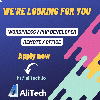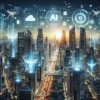Introduction
Artificial Intelligence (AI) has rapidly advanced in recent years, with a massive impact on various industries. According to a recent Gartner report, AI has become so integrated into software development that 80% of software engineers will need to upskill by 2027 to stay relevant in the job market. While AI is not expected to replace human software engineers entirely, the growing adoption of AI-driven tools and platforms means engineers will need to adapt or risk being left behind. In this article, we explore why upskilling is crucial, how AI is reshaping software development, and what skills engineers should focus on to thrive in an AI-driven future.
The Rise of AI in Software Development
The increasing use of AI in software development is inevitable. AI tools, such as GitHub Copilot and other generative models, have begun to automate repetitive coding tasks. This has increased productivity and allowed software engineers to focus on more complex, creative work. However, while this is a short-term benefit, AI's capabilities are rapidly expanding, with many tasks traditionally handled by engineers now being automated.
Gartner’s Predictions on AI and Software Engineering
Gartner’s analysis highlights a three-phase impact of AI on the software engineering profession. In the short term, AI tools will function within defined boundaries, helping engineers by improving workflows and automating mundane tasks. In the medium term, AI will become more autonomous, with most code being generated by AI agents rather than written by human hands. In the long term, AI will significantly enhance software development efficiency, creating a need for engineers who are proficient in both traditional development and AI technologies.
Why Upskilling is Non-Negotiable
Gartner’s report underscores that software engineers cannot remain static in their skill sets. AI is not a fleeting trend; it is here to stay. To remain relevant and employable, software engineers must develop new competencies in areas like AI, machine learning (ML), and data engineering. While some fear that AI might replace software engineers, experts agree that AI will instead create new roles, such as AI engineers, who combine traditional development skills with expertise in AI.
New Roles and Opportunities for Software Engineers
The emergence of new roles in software engineering is one of the most exciting aspects of the AI revolution. AI will create demand for engineers who can build, maintain, and enhance AI systems. These professionals, often referred to as "AI engineers," will work at the intersection of software development, data science, and machine learning. They will design and implement AI-driven solutions that power everything from automated decision-making to intelligent software development tools.
What Skills Software Engineers Need to Survive and Thrive
To stay competitive, software engineers will need to upskill in various areas. Key skills include:
- AI and Machine Learning Algorithms: Understanding the basics of AI and how ML models are developed and deployed will be essential for future software engineers.
- Natural Language Processing (NLP): As generative AI systems continue to evolve, engineers must learn how to incorporate NLP techniques to improve the functionality of AI-driven software.
- Data Engineering: With AI systems reliant on vast amounts of data, engineers will need to master the techniques of collecting, processing, and storing data efficiently.
- Prompt Engineering: Knowing how to write effective prompts for generative AI models will be key to maximizing AI’s potential in software development.
- Cloud Computing and AI Platforms: Engineers must become proficient in using cloud-based AI platforms to build scalable, AI-empowered applications.
The Role of Senior Engineers in the AI-Driven Future
As AI tools continue to evolve, senior engineers are likely to benefit the most in the early stages. Their experience will be valuable in leveraging AI to optimize workflows, streamline development processes, and implement AI in enterprise-level applications. These engineers will also play a key role in mentoring younger developers on integrating AI into their skill sets.
The "AI-First" Mindset: A Must for Future Engineers
With AI taking on more responsibility in software development, future engineers will need to adopt an "AI-first" mindset. This means they must be comfortable with steering AI-driven tools to achieve their goals. Engineers who can effectively guide AI systems will become indispensable in the workplace, using AI as a co-pilot rather than as a mere tool.
Addressing the Skills Gap in AI/ML
Despite the growing demand for AI/ML skills, many engineers today feel unprepared for the shift. According to Gartner’s survey of 300 organizations, 56% of software engineers believe AI/ML expertise is the most in-demand skill set. However, a large percentage of them also acknowledge that they lack the necessary skills to fully integrate AI into software development processes.
AI-Generated Code: Boon or Bane?
AI-generated code has sparked debate within the engineering community. While tools like GitHub Copilot promise to boost productivity, there have been concerns about the quality of AI-generated code. Some studies have shown that AI-generated code can lead to more bugs, requiring human engineers to step in and correct mistakes. This underscores the need for engineers to develop strong debugging and testing skills in an AI-driven world.
How AI is Impacting Job Opportunities for Engineering Graduates
For recent graduates, the growing prevalence of AI in the software industry presents both a challenge and an opportunity. Those entering the workforce must prioritize AI and ML in their education, as traditional coding skills alone may no longer be sufficient to land a job. Engineering programs and certifications in AI and data science will become increasingly important for securing high-paying roles in the tech industry.
The Importance of Interdisciplinary Knowledge
Future software engineers will not only need to master AI but also develop interdisciplinary knowledge. A successful AI engineer will be able to combine expertise in software engineering, data science, and machine learning. This convergence of skills will make them versatile and highly valuable in an AI-driven job market.
Upskilling for the AI-Driven Workforce: Key Strategies
To upskill effectively, software engineers should consider the following strategies:
- Take AI/ML Courses: Engineers can enroll in specialized courses, boot camps, or online certifications in AI and ML to build their knowledge base.
- Hands-on Projects: Engaging in real-world projects that involve AI applications will help engineers gain practical experience.
- Networking and Mentoring: Connecting with professionals already working in AI-related fields can provide insights and mentorship opportunities.
- Staying Updated: The AI landscape is constantly evolving, and staying current with the latest tools, frameworks, and platforms will be crucial.
AI-Driven Tools: Friend or Foe?
AI-driven tools, while incredibly powerful, have also raised concerns about job displacement. However, rather than viewing these tools as threats, software engineers should see them as enablers. By leveraging AI to handle routine tasks, engineers can focus on innovation and solving complex problems that require human creativity.
Conclusion
As AI continues to shape the future of software development, the message from Gartner is clear: upskilling is essential. AI will not replace software engineers but will transform their roles, creating opportunities for those who adapt and excel in this new era. Engineers who embrace AI, machine learning, and data science will be at the forefront of the next technological revolution. The future belongs to those who are willing to learn, grow, and innovate alongside AI.
FAQs
1. Will AI completely replace software engineers?
No, AI will not completely replace software engineers. Instead, it will augment their capabilities and create new roles that combine traditional development skills with AI expertise.
2. What is AI prompt engineering, and why is it important?
AI prompt engineering involves crafting prompts to guide AI systems effectively. It’s crucial for software engineers working with generative AI models to optimize the AI's output and functionality.
3. What specific AI skills should engineers focus on?
Engineers should focus on skills like machine learning algorithms, data engineering, natural language processing, and cloud-based AI platform integration.
4. How will AI impact recent engineering graduates?
AI will require recent graduates to prioritize AI and machine learning in their studies. Without these skills, they may struggle to compete in the job market as AI-driven development becomes more prevalent.
5. Can AI-generated code be trusted?
While AI-generated code can enhance productivity, it’s not without flaws. Engineers will still need strong debugging and testing skills to ensure the quality of the code.
















